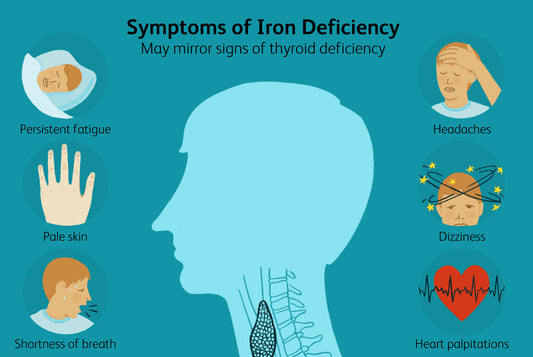Iron is an essential nutrient for wellbeing.
It forms part of the haemoglobin in our blood, which is responsible for holding and transporting the oxygen we breathe in through our lungs to all parts of the body. Iron is also a component of myoglobin, which gives the oxygen to our muscles.
Irons other important functions include making up part of the enzymes responsible for energy production. It also supports our immune system and plays a significant role in cell differentiation.
An iron deficiency is often characterised by tiredness, weakness, brain fog and dizziness. These symptoms may even present before clinical iron deficiency can be diagnosed.
How much do I need?
- Women who are menstruating need about 18mg every day.
- Men and post-menopausal women only require 8mg every day.
Sources
There are two types of dietary iron, haem-iron and non-haem iron.
Haem-iron is found animal sources such as beef, liver, fish and egg yolks.
Non-haem iron are from plant sources, your body requires a lot more of this iron to match the absorption rate of haem-iron. Plants highest in iron include quinoa, pumpkin seeds, cashew nuts and kale. Having a source of vitamin-C alongside iron-rich foods helps absorption, a squeeze of fresh lemon juice on a kale salad.
There are a lot of factors against iron absorption too. Tannins which are found in tea, coffee and wine inhibit absorption, so do phytates which are compounds found in many vegetables and nuts. Calcium also inhibits iron absorption, so it’s best not to pair iron rich sources with dairy if you are trying to raise your iron level.
Who may need a supplement
- If you have recently had a blood test with iron below the acceptable range or at the lower end.
- If you follow a vegetarian or vegan diet.
- Breastfeeding and pregnant women.
When to see your doctor
- If you are a male or post-menopausal woman with low iron. This may need further investigating and could be indicative of malabsorption or blood loss.
- If you have been on iron supplements for a while with no improvement.
- If your blood test results indicate you may need to consider an iron infusion.
Supplement Options
If you need to consider taking an iron supplement, you may be put off by the potential side effects. Gastrointestinal upsets are commonplace when taking iron tablets, capsules or liquids.
Metagenics Hemagenics Iron Advanced contains a vegetarian and vegan source of bioavailable iron, vitamin C, folate and vitamin B12 for maximal absorption. The iron isn’t dispersed through the digestive tract like regular supplements, and is intact until it is transported through the intestinal wall. This is a practitioner-only supplement, so is available to our members via our online store...
























